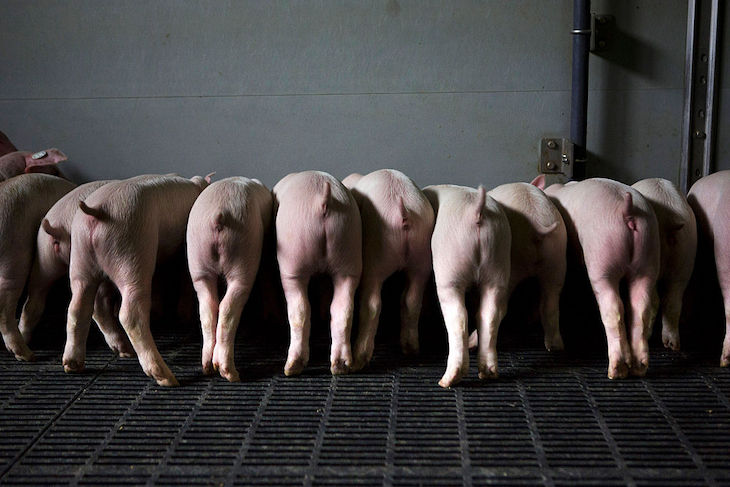We all know the nursery rhyme about “this little piggy”: one little piggy went to market, one little piggy stayed home and so on. A modern rewrite could also include the little piggy that got injected into a rich man’s body.
The “super-rich” are using pigs brains to try and “biohack their way to immortality,” according to a report in the Daily Telegraph. Wealthy coffin-dodgers have regular injections of Cerebrolysin, a mixture of compounds taken from pig brains, to boost their brain health.
Wealthy coffin-dodgers have regular injections of Cerebrolysin, taken from pig brains, to boost their health
This isn’t the only way that pigs are being exploited in modern healthcare. Over the past three years, surgeons in the US have transplanted a genetically edited pig heart into three human patients, two of whom died within months.
I’m vegan so I wouldn’t go within a mile of any of those treatments on ethical grounds alone, but I can see why some would be tempted. Pigs are generally thought of as dirty and greedy creatures. Why should anyone care about a silly pig losing its life to extend or even save their own?
Well for a start, that public image of pigs isn’t fair at all. Researchers at Cambridge University found that pigs are as smart as three-year-old humans. They can learn sign language, play computer games and remember someone they met as far back as three years previously.
Neuroscientists at Emory University found that pigs can solve problems as well as chimpanzees. Rather chillingly, a slaughterman who killed pigs for a living told the Times: “I reckon they have got more sense than we have.”
As well as being clever, pigs can be loving and brave. In Pennsylvania, a pig called Lulu saved the life of her owner, who’d suffered a heart attack. The pig lay down in the road, bringing traffic to a standstill and led one of the drivers to her owner. An ambulance was called.
A pig called Priscilla rescued a mentally challenged boy who was drowning in a lake in Texas. She swam him to safety as he grasped her collar. A pig called Lucky saved a woman and her two grandchildren by waking them as their Illinois home began to burn down.
Those stories of pigs saving humans’ lives are even more poignant when you consider how ghastly humans are to pigs. On British farms, sows are often kept for life in metal crates just centimetres bigger than their bodies.
Piglets usually have their ears punctured, teeth clipped and tails cut without anaesthetic. Those who don’t grow quickly enough are sometimes killed by being slammed headfirst onto concrete floors in an industry practice known as “thumping”.
A pig’s natural lifespan is up to 12 years, but they’re sent for slaughter when they’re only six months old. In the UK, most pigs are killed in gas chambers. Eyewitnesses say the pigs scream in pain, gasp for breath and desperately try to escape. Some say that the last sounds from the pigs sound exactly like the cries of human children.
Footage from an abattoir in China showed a pig valiantly trying to stop its friend from being slaughtered by running at the workers. Who are the savages in these stories and who are the ones showing love?
We like to tell ourselves that the animals whose body parts we eat had a good life and a compassionate death. In reality, baby pigs cry like little children as they’re gassed to death for your bacon.
It seems almost Frankenstein-like to modify the genes of animals to try and make them more like us so we can take their organs. Scientists changed ten genes in the pigs whose hearts were used for human transplants so the organs wouldn’t be rejected, but two of the three patients died anyway. Maybe we should take the hint?
Listen, I get that vegans can be annoying. A lot of people think we’re a bit full of ourselves. Probably some of us are. But how full of yourself do you have to be to think that sweet baby animals must die so you can inject part of them into your body, in the hope it makes you live forever?







Comments